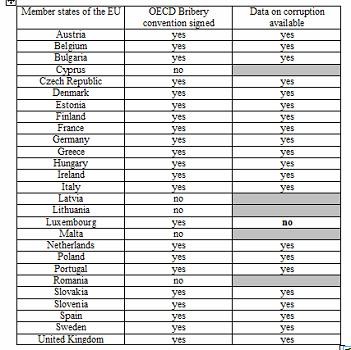06/28/2009
Luxembourg: the slow-witted EU jurisdiction in the fight against corruption (update)
TI has just published a report on the enforcement of the OECD Bribery Convention.
In the report it is stated page 7 that “No TI reports were prepared for three countries, Estonia, Iceland and Luxembourg, since TI lacks experts in those countries, but TI Estonia provided current data on cases and investigations”.
It appears that in the tables data are actually missing only for two jurisdictions: Iceland, the jurisdiction that went bankrupt, and Luxembourg.
As far as Iceland is concerned, the jurisdiction is not an EU Member State. It has just hired Judge Eva Joly to tighten up the ship on the economic collapse and related crimes. There is no doubt that thanks to this powerhouse in the fight against corruption, the jurisdiction will be able to provide data in the future. But Eva Joly faces problems and said she would quit unless radical changes are implemented to prevent conflicts of interest and provide relevant means.
As far as Luxembourg is concerned, to begin with it is interesting to observe that the TI report confirms the relevance of my comparison Luxembourg v. Switzerland in favour of Switzerland as Switzerland is very well ranked in the enforcement of the OECD convention.
Additionally, among the EU Member States that signed the OECD convention (most States) Luxembourg distinguishes itself, as it is the only jurisdiction that is unable to provide data, which is telling for a jurisdiction that is an important financial center despite it is a tiny state.
As I explained, because of its small size, there are many conflicts of interest that may turn de facto into objective corruption situations without money paid, what is called the "system".
Networks
There are many associations in Luxembourg, but the center is very small so everybody meets in the same associations and when there is an issue involving a member a couple of phone calls to fellow member may help to hush up the issue. Everybody in the network knows the issue but there is no need to repudiate the bad professional that is supported by the group. To consolidate the support fellow members may knowingly join a board with the member in question. The problem in Luxembourg is that it is visible because of the small size, which is not the case in a bigger country where the bad professional may move up to another state to join the same kind of association but with new fellow members.
Intimidation
This situation is met when people do not do their duty because they fear for their job. This is particularly verified
- for internal auditors and compliance officers because of the subordination in the framework of the employment contract,
- for external auditors because of the business contract especially in a country where the leader of audit focuses on its growth and clients' confidence (not stakeholders'), which is not compatible with international professional provisions relating to audit ethics. This situation may explain the reason why there are so few declarations of suspicion (only 4) from auditors, which was considered suspect by the CRF, the Luxembourg FIU (Cf. for example Report 2003-2004, page 8 , were the number of 3 (close to 4) was said "ridiculously low for a profession composed of 304 members individual and having access to all the financial information of the center")
Fame
This last type of situation is met when people may hesitate to do or do not at all do their duty because they do not want to involve people that gain a professional standing because of professional, political or academic supports (in a board, in an association...). In other word, the will is to protect the frontage of the reputation of the center and its professional in any case. This is particularly verified
- for the media that have a public financing and globally do not have the culture to criticise the "system" and to tighten up the ship (even though there are exceptions),
- for justice, that lacks means (Cf. report "Petita Pro Nova Justitia" issued by the Cercle Joseph Bech), a perfect illustration of this problem being the delay to judge sensitive affairs and the absence of judgements database.
The decision of the CSSF on UBS about Madoff is perfect illustration of how the "system" works with a wrong perception of the stake as the case is not internal.
Management of UBS/Luxalpha were close to Management of the CSSF, in CSSF Committees for example.
The CSSF did not sanction UBS where there would have been a sanction in any other jurisdiction.
I do not think that Luxembourg, where the criminal liability for legal persons does not exist despite an injunction last year by the OECD, may be credible with the launch of the LIGFI to promote worldwide stronger ethical practices and standards based on the principles of integrity: transparency, fairness, responsibility and accountability.
11:36 Posted in Luxembourg | Permalink | Comments (0)








The comments are closed.